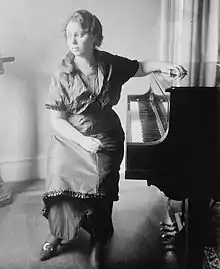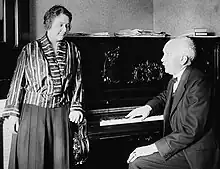Elisabeth Schumann
Elisabeth Schumann (13 June 1888 – 23 April 1952) was a German lyric soprano who sang in opera, operetta, oratorio, and lieder. She left a substantial legacy of recordings.[1]

Career
Born in Merseburg, Schumann trained for a singing career in Berlin and Dresden. She made her stage debut in Hamburg in 1909. Her initial career started in the lighter soubrette roles that expanded into mostly lyrical roles, some coloratura roles, and even a few dramatic roles. She remained at the Hamburg State Opera until 1919, also singing during the 1914/1915 season at the Metropolitan Opera, New York. [2]

From 1919 until 1938, she was a star of the Vienna State Opera. Her most famous role was that of Sophie in Richard Strauss's Der Rosenkavalier, but she also excelled in Mozart, taking the roles of Pamina in The Magic Flute, Zerlina in Don Giovanni, Blonde in Die Entführung aus dem Serail and Susanna in The Marriage of Figaro.
Despite her glittering operatic career, she excelled in lieder. Lotte Lehmann, in many ways her rival, paid her the tribute of saying that she represented perhaps the purest singing style of German lieder. The production of her voice, which was not particularly powerful, was so good; and enabled her to continue giving recitals long after many singers retire. This is most evident in her rendering of Schubert's "Du bist die Ruh" which requires a steadiness and purity of tone beyond most singers.[3] This technique sustained her in dramatic operatic roles like Der Rosenkavalier. Her careful use of vibrato, never coarse, gave volume and sonority.
The conductor Karl Alwin was her second husband from 1920 until 1938. In 1938, she emigrated to New York City where she lived until her death on 23 April 1952, aged 64. During World War II she gave recitals but mainly taught singing, privately and at the Curtis Institute of Music in Philadelphia. One of her pupils at Curtis was soprano Florence Kirk. After the war she gave many recitals in Europe, making a particularly successful comeback in England.
She was a much-loved artist, admired for her vivacity, elegance, and beauty. She was closely connected with Richard Strauss, Otto Klemperer, Lotte Lehmann, Bruno Walter, Wilhelm Furtwängler, and other leading musicians of the first half of the 20th century.
Death
Elisabeth Schumann died in New York City, New York. She was buried in St Martin's Church, Ruislip, England. Her son is also interred in the same plot.
Honors
- Honorary Member of the Vienna State Opera and the first female Honorary Member of the Vienna Philharmonic.[4]
Opera roles
In a career spanning 28 years, Schumann sang 91 roles. Her debut role was the Shepherd Boy in Tannhäuser on 2 September 1909 in Hamburg; on 1 November 1937 her last role was the First Flower maiden in Parsifal in Vienna.[5]
|
|
Biography
- Elisabeth Schumann: a Biography by (her son) Gerd Puritz, edited and translated by her granddaughter, Joy Puritz, published 1993 by André Deutsch, London, ISBN 0-233-98794-0 (out of print); revised paperback edition published 1996 by Grant and Cutler, London, ISBN 9780729303941
Recordings
- Great Voices of the Century sing Exotica, SCSH 005[6]
- "Elisabeth Schumann: Silver thread of song", EMI Classics, 2011, digitally-remastered 6-CD set, 5099991848024.
References
- "Elisabeth Schumann (Soprano) - Short Biography". www.bach-cantatas.com. Retrieved 2023-04-15.
- "Elisabeth Schumann | Opera, Lieder & Recitals | Britannica". www.britannica.com. Retrieved 2023-08-28.
- "Elisabeth Schumann (Soprano) - Short Biography". www.bach-cantatas.com. Retrieved 2023-08-28.
- Elisabeth Schumann at Naxos Records, retrieved on December 3, 2007.
- "The Opera Roles of Elisabeth Schumann" Archived 2008-12-21 at the Wayback Machine, ElisabethSchumann.org, accessed 23 October 2008
- Great Voices of the Century sing Exotica SanCtuS Recordings
External links
 Media related to Elisabeth Schumann at Wikimedia Commons
Media related to Elisabeth Schumann at Wikimedia Commons- Elisabeth Schumann website, discography, photographs (2003)
- Elisabeth Schumann at Find a Grave